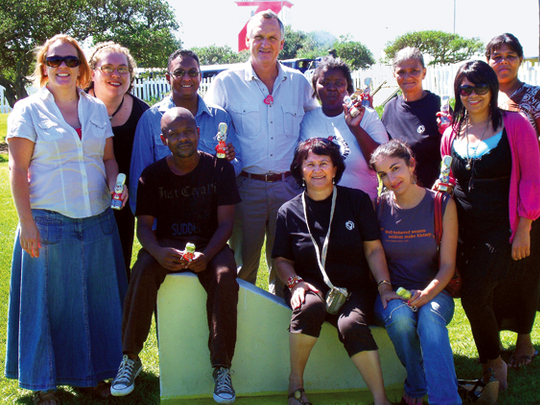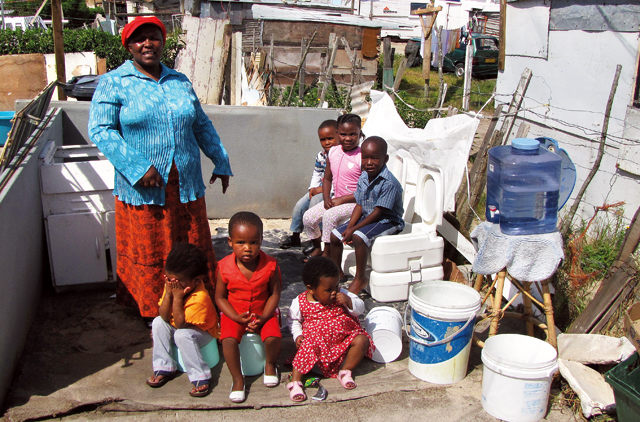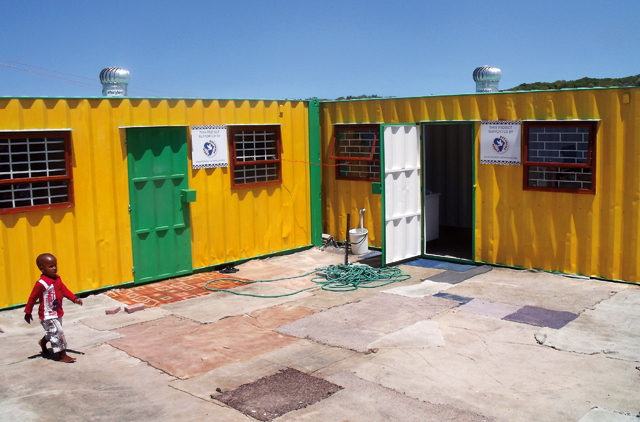
Thando was delighted. He was up early and was preparing to go on a short trip with a few children he had befriended recently. The eight-year-old orphan, who had been living on the streets of a shanty town called Grabouw in the Western Cape province of South Africa for as long as he could remember, had never been on an excursion before and was looking forward to it.
"We are going to the beach, we can play on the sand and, of course, there will be a nice picnic lunch," his friend told him.
Thando was truly excited. And it was not just because he was going to play on the sand. He also had friends to talk to, adequate meals, a shelter to call home, and more importantly, did not have to worry about the dangers that lurked in the streets. For all this Thando has Breadline Africa to thank.
The volunteers of the NGO found him loitering on the streets and took him under their wing, putting him up in a foster home and enrolling him in a school. And today the school is taking the students on a trip to the beach.
"It is a big annual event where we take more than a thousand disadvantaged kids like Thando for an outing," says Edna Titus of Breadline Africa.
Breadline Africa has an early childhood development umbrella that helps youngsters grow and thrive, physically, mentally, emotionally, spiritually, morally and socially. A UK-registered charity based in South Africa, it seeks to help communities find sustainable, long-term solutions to problems created by poverty.
According to the organisation, almost 40 per cent of children in South Africa grow up in conditions of abject poverty and neglect. The infant death rate is high. Those who survive are often at risk of stunted growth and other health issues. They find it difficult to adjust to school and the dropout rates are high.
Without doubt, timely and appropriate intervention can help. "The challenge is to help break the cycle of poverty by increasing access to Early Childhood Development (ECD) programmes, particularly for less privileged children, and to improve the quality of these programmes," says Titus, who set up Breadline Africa's first local office and became its first full-time employee. Quick fixes have limited impact, says Titus. Supporting projects that will make a difference is the need of the hour.
Most of the projects that Titus and her team support started off by teaching or feeding children who lived in shacks. She says she found the living conditions appalling. Hygiene was poor and the main cause for illnesses among children. Keen to make a difference in their lives, Titus decided to introduce ablution blocks in the shanty town. And for this she chose a novel medium - old shipping containers.
The box rooms
Thinking out of the box so to speak, Breadline Africa then converted old shipping containers into just about anything you can think of - schools, kitchens, clinics, libraries - that is required in a community.
In fact, the very first initiative Breadline Africa embarked upon way back in 1992 was to request donations to purchase old and decommissioned shipping containers. Apart from being strong, they also offer protection against the elements. They are easy to install, can be moved to different locations if necessary and are easy to clean. Containers can double as toilets, kitchens, homes, indoor play areas...
Breadline also has a container that has an interesting history. In 2008, the BBC, as part of an editorial project, connected a GPS transmitter to a shipping container to track international trade. The Box, as it was named, travelled around the globe delivering goods. Once the project was over, the BBC donated the container to Breadline Africa. Thus it came to rest in a little town in the Western Cape.
"I'm delighted this editorial venture is now going to have a long-term charitable benefit," said Jeremy Hillman, BBC news editor.
The Box is now a fully equipped soup kitchen that serves the underprivileged of Kleinvlei in the semi-rural community of Eerste Rivier (Afrikaans for First River) outside Cape Town.
Old shipping containers have also been converted into clinics where local nurses and volunteers can attend to patients. "I added value to the container concept by broadening its usage," says Titus. "I've also introduced the idea of container libraries where children can come and read."
Titus says they are lucky because they receive generous donations from sponsors. "From donations and benefits we try to create an atmosphere that will make young people look forward to going to school and become eager to pursue education. We want to give them the best opportunities from the limited resources we have. We assess a community's needs and work out a plan to deal with them. We place more value on youngsters," she says.
So no child will go hungry...
Titus, 55, was born and brought up in a suburb called Elsies River in Cape Town. "I come from a family where life was tough and money was scarce. My mom worked in a factory as a machinist and my dad was a carpenter. I have seen and experienced poverty and have dedicated most of my career to helping others and making sure no child goes hungry."
Titus joined the Girl Guides Association of South Africa not knowing that she was honing her skills for the future. "We were taught how to correspond with pen friends. Through this I developed a passion for writing and communicating with people. When I began working at my very first charitable job, this is exactly what I was required to do - write letters to donors. The personal responses and envelopes that arrived just made me feel so excited. I was also able to deliver personally the gifts that donors sent to people in need. This awakened the spirit of giving and making other people happy. And that is what I am still doing today through my work at Breadline Africa," she says.
Titus, at times, receives overwhelming responses from the beneficiaries. "Breadline Africa donated a crèche to a beneficiary so she could look after children whose parents were working on a farm in Grabouw. I also took her to buy foodstuffs for kids. When I told her to buy supplies for a month, she started dancing and clapping her hands, and singing out loud: ‘Edna makes us happy, Edna makes us happy.' I was so embarrassed as she was telling everyone about the crèche container we had donated and the fact I had brought her to the shop to buy food.
"I didn't expect such a reaction from someone who has nothing. But I realised this was the only way that she could express her appreciation."
Before joining Breadline Africa, Titus was part of The Haven Night Shelter, an organisation that raises funds for building shelter for the homeless. "I was the first full-time employee at Breadline Africa and it was a challenge to set up the local office to establish its own identity. Since then I have built good relationships with supporters and beneficiaries of Breadline Africa nationally and internationally."
A graduate in business and marketing, Titus was awarded a place in Who's Who of Southern Africa for having made a difference in the life of poor communities. "To never give up on what we would like to become was the advice from my parents and they always supported me and that I believe has been my route to success."
The more helpers, the better
Titus would like to involve more people in her work. "We'd love to form partnerships with organisations that can help us with books. We have been busy with a huge project whereby we partnered with the Nelson Mandela Foundation this year to celebrate his birthday. Every year on July 18, all South Africans are encouraged to do 67 minutes of community work."
Breadline Africa plans to place nine containers, which have been renovated and turned into libraries, in nine provinces in South Africa.
"Nine schools have already been identified and they'll appoint a librarian to co-ordinate the container library. Collecting books is our prime concern now," says Titus.
Breadline Africa has international supporters mostly from the UK, Ireland and the Netherlands. "We have extended our support to the SADC (Southern African Development Community) countries. We don't have a volunteer system but we do network with other organisations that have efficient programmes in place and work together for mutual benefits."
Making a difference
Who: Edna Titus
What: Breadline Africa, an NGO trying to alleviate poverty in Africa
How: By empowering communities. One of the initiatives includes converting old shipping containers into schools, libraries and soup kitchens
Inside info
If you would like to lend a helping hand to Breadline Africa, visit http://www.breadlineafrica.org/
Sami Said Ali is a Sharjah-based freelancer













